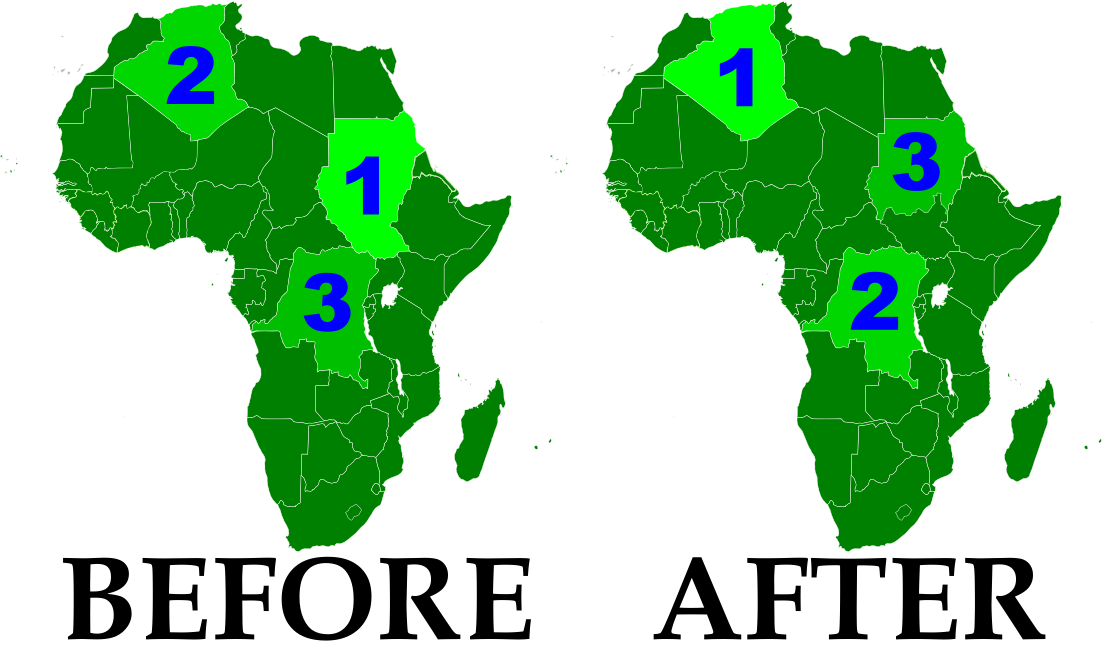What Is Africa's Largest Country? Discovering The Continent's Geographic Giant
Africa's largest country is a topic that sparks curiosity, not just for geography enthusiasts but for anyone interested in the diverse landscapes and cultures of the continent. Understanding which country holds this title is essential for grasping the vastness of Africa, a continent rich in history, resources, and unique biodiversity. This article delves into the details of Africa's largest country, exploring its geography, culture, economy, and more.
As we embark on this journey to uncover the largest country in Africa, we'll provide you with insights that go beyond simple geography. We'll explore the implications of size on the country's resources, population, and cultural diversity. By the end of this article, you'll not only know which country is the largest in Africa but also understand what makes it so unique.
Join us as we unravel the details about Africa's largest country and what it means for the continent as a whole. From its sprawling landscapes to its rich cultural heritage, there is much to learn about this geographic giant!
Table of Contents
- What is Africa's Largest Country?
- Geography of Algeria
- Cultural Diversity in Algeria
- Economic Overview of Algeria
- Political Landscape of Algeria
- Historical Background of Algeria
- Biodiversity in Algeria
- Conclusion
What is Africa's Largest Country?
The title of Africa's largest country is held by Algeria, covering an impressive area of approximately 2.38 million square kilometers (919,595 square miles). This vast expanse makes Algeria not only the largest country in Africa but also the 10th largest country in the world. Its geographical positioning in North Africa places it along the Mediterranean coastline, sharing borders with several countries such as Tunisia, Libya, Niger, Mali, Mauritania, Western Sahara, and Morocco.
Geographical Features of Algeria
Algeria is characterized by a diverse range of geographical features, including:
- The Sahara Desert, which covers more than four-fifths of the country's area.
- The Atlas Mountains, which run through the northern part of Algeria.
- Coastal plains along the Mediterranean Sea.
Geography of Algeria
Algeria's vast landscape is predominantly desert, with the Sahara making up a significant portion of its territory. The country's geography is diverse, featuring coastal areas, mountains, and plateaus. The northern region is more temperate, with Mediterranean climate influences, while the southern region transitions into the arid and semi-arid climate of the Sahara.
Major Cities
Some of the major cities in Algeria include:
- Algiers (the capital city)
- Oran
- Constantine
- Annaba
Cultural Diversity in Algeria
Algeria boasts a rich tapestry of cultures influenced by Berber, Arab, French, and other traditions. This cultural diversity is reflected in its languages, cuisine, music, and festivals. The official languages are Arabic and Berber, with French also widely spoken due to historical ties.
Traditional Festivals
Some notable cultural events and festivals include:
- The Amazigh New Year (Yennayer)
- The National Festival of Amazigh Culture
- Algeria's Independence Day celebrations
Economic Overview of Algeria
Algeria's economy is largely based on hydrocarbons, with oil and natural gas accounting for a significant portion of the country's revenue. The country ranks among the top oil producers in Africa and is a member of the Organization of the Petroleum Exporting Countries (OPEC).
Key Economic Sectors
In addition to hydrocarbons, other key sectors of the Algerian economy include:
- Agriculture
- Mining and minerals
- Manufacturing
Political Landscape of Algeria
Algeria has a complex political history, shaped by its struggle for independence from French colonial rule in 1962. The country operates as a semi-presidential republic, with a president serving as the head of state and a prime minister leading the government.
Recent Political Developments
Recent years have seen significant political changes in Algeria, including:
- Mass protests demanding political reform in 2019.
- The resignation of long-time president Abdelaziz Bouteflika.
- Efforts to establish a more democratic political system.
Historical Background of Algeria
Algeria's history is marked by various influences, including indigenous Berber cultures, Arab conquests, and French colonization. The struggle for independence in the 20th century was a pivotal moment in the country's history, leading to the establishment of an independent state.
Colonial Resistance
The resistance against French colonial rule was characterized by:
- Nationalist movements and uprisings.
- The Algerian War of Independence (1954-1962).
- The establishment of the Front de Libération Nationale (FLN).
Biodiversity in Algeria
Algeria is home to a wide range of biodiversity, particularly in its various ecosystems, from the Mediterranean coasts to the Sahara Desert. The country hosts numerous endemic species of plants and animals, making it a vital area for conservation efforts.
Natural Reserves
Some notable natural reserves and parks include:
- Ahaggar National Park
- Tassili n'Ajjer National Park
- Chréa National Park
Conclusion
In conclusion, Algeria stands as Africa's largest country, not only in terms of land area but also in its rich cultural, historical, and ecological diversity. From its sprawling deserts to its vibrant cities, Algeria offers a unique glimpse into the heart of North Africa. We invite you to share your thoughts, explore more about Algeria, or check out other articles on our site!
As you continue your exploration of Africa, remember that each country has its own story, waiting to be discovered. Don't forget to leave a comment below or share this article with others who may find it interesting!
Thank you for reading, and we hope to see you again for more engaging content!
Dylan's In Trouble: Understanding The Current Situation
Naija Blow: Your Ultimate Guide To Nigerian Entertainment And Culture
Understanding Gigavhad: The Future Of Digital Collaboration


